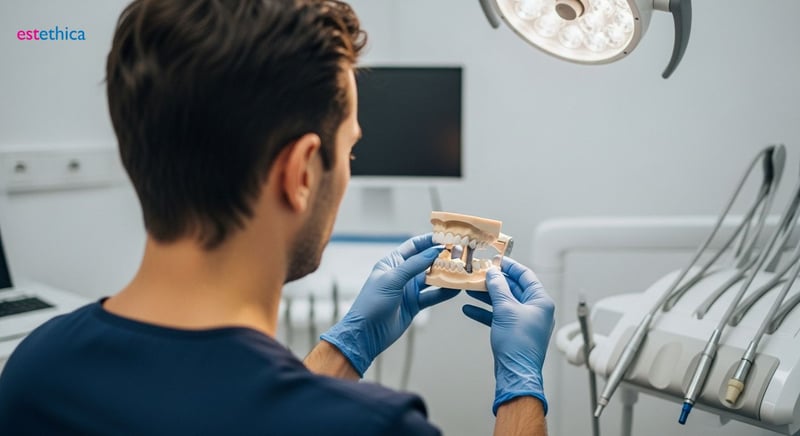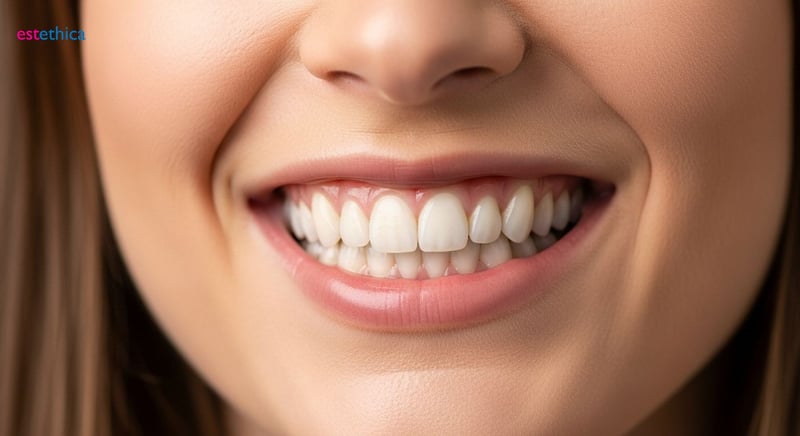Dental Implants: The Future of Teeth Replacement
Explore the transformative power of dental implants—the future of lasting, natural-looking teeth replacements.
Dental implants represent a monumental shift in restorative dentistry. By closely mimicking the natural structure of teeth, these implants provide an unparalleled level of functionality and aesthetics. In a world where dental health directly impacts overall well-being, understanding the nuances of dental implant technology is crucial. This guide dives into the foundational concepts, benefits, and critical comparisons to enlighten patients considering dental implants.
Unlocking the Power of Osseointegration in Implant Dentistry
The Science Behind Successful Dental Implants
Osseointegration is paramount to the functionality of teeth replacement. It's the direct structural and functional connection between living bone and the surface of a load-bearing artificial implant. This process allows the implant to perform like a natural tooth root, ensuring that dental prosthetics are stable and durable. One key aspect of osseointegration is the biocompatibility of the materials used; dental implants made from titanium are widely used due to their ability to integrate seamlessly with bone tissues. The procedure for achieving successful osseointegration typically involves precise surgical placement of the implant, followed by a healing period during which bone grows around the implant surface.
- A rough implant surface promotes better bone adhesion, enhancing stability for applications like all on 4 dental implants, especially in full arch restoration cases.
- Proper surgical technique is essential; for example, avoiding overheating the bone during implant placement is crucial for successful osseointegration.
- Regular check-ups and good oral hygiene are vital to maintain the health of the surrounding tissues and bone, which supports the long-term success of dental implants near me.
Factors Influencing Osseointegration and Long-Term Implant Success
Several factors can affect how well an implant integrates with the jawbone. Patient health, including conditions like diabetes or osteoporosis, can impact osseointegration. Additionally, lifestyle choices such as smoking can significantly hinder the healing process, increasing the risk of implant failure. Understanding these factors can guide dentists in tailoring treatment plans. The dentist may prefer Zirconia Dental Implants due to their chemical inertness. Ultimately, this approach contributes to the long-term success and stability of dental implants.
- Initial Assessment: Comprehensive evaluation of the patient's oral and general health ensures suitability for dental implants and identifies potential risk factors impacting osseointegration.
- Surgical Precision: Accurate placement of the implant using advanced techniques minimizes trauma to the bone, optimizing the conditions for bone growth and integration.
- Post-operative Care: Strict adherence to post-operative instructions, including meticulous oral hygiene and regular follow-up appointments, safeguards the osseointegration process and prevents complications.

Dental Implants vs. Dental Bridges: Which is Right for You?
Longevity and Functional Benefits of Dental Implants
Choosing between dental implants and bridges involves considering the long-term functionality and health of your oral structure. Dental implants are surgically anchored into the jawbone, acting as a sturdy base for replacement teeth. This design not only mimics the natural tooth structure but also stimulates bone growth, preventing bone loss that typically follows tooth extraction. In contrast, dental bridges rely on adjacent teeth for support, which can subject these teeth to additional stress and may compromise their long-term health. Esthetica Global prioritizes treatments that preserve and enhance overall oral health, making dental implants a favored choice for patients seeking a durable and functional solution.
- Implants offer a stable, permanent solution that functions similarly to natural teeth, facilitating normal eating and speaking abilities.
- The process of osseointegration ensures that the implant becomes a solid part of the jaw, providing unparalleled stability and preventing the shifting of adjacent teeth.
- Unlike bridges, implants do not require altering healthy adjacent teeth, preserving more of your natural tooth structure.
Understanding Treatment Timelines and Maintenance for Dental Implants
The timeline and maintenance requirements are crucial aspects to weigh when considering dental implants or bridges. Dental implants typically require a longer initial treatment period, involving several months for osseointegration, the process where the implant fuses with the jawbone. However, this investment in time translates to a solution that, with proper care, can last a lifetime. Maintenance involves regular oral hygiene practices and routine check-ups, similar to caring for natural teeth. Conversely, while bridges offer a quicker solution, they often require replacement every 5 to 15 years, incurring additional costs and dental visits over time. Ultimately, choosing between implant dentistry and bridges depends on your willingness to invest in a long-term solution versus a quicker, potentially less durable fix. Esthetica Global focuses on providing comprehensive care and education to ensure the longevity and success of your dental implants.
- Consultation and Evaluation: A thorough examination to assess bone density and overall oral health to determine if you are a suitable candidate for dental implants.
- Implant Placement: Surgical insertion of the implant into the jawbone, followed by a healing period to allow for osseointegration.
- Restoration: Attachment of the artificial tooth (crown) to the implant, completing the process and restoring functionality.

Full Arch Restoration: A Complete Guide to Teeth Replacement
Benefits of Full Arch Restoration with Dental Implants
Full arch restoration through implant dentistry not only revitalizes the aesthetics of a smile but also significantly improves oral function. This comprehensive approach involves using multiple dental implants to support a full set of replacement teeth, seamlessly integrating with the jawbone through osseointegration. By choosing full arch restoration, patients can experience enhanced chewing efficiency, clearer speech, and a boost in self-confidence. estethica Global excels in providing these advanced solutions, ensuring that each patient receives personalized care and achieves a natural-looking, long-lasting smile.
- Improved Chewing Efficiency: Allows for a more varied and nutritious diet, enhancing overall health and well-being.
- Enhanced Speech Clarity: Restores the natural structure of the mouth, aiding in proper pronunciation and clearer communication.
- Long-Term Stability: Provides a durable foundation for replacement teeth, preventing common issues associated with dentures, such as slipping or discomfort.
The Full Arch Restoration Process: From Consultation to Completion
The journey to a restored smile with full arch restoration involves several key steps, beginning with a thorough consultation and assessment at estethica Global. During this initial phase, our skilled dental professionals evaluate your oral health, bone density, and overall suitability for dental implants using advanced imaging technology. Following the evaluation, a customized treatment plan is developed, outlining the precise placement of dental implants and the design of your new set of teeth. Careful planning ensures optimal aesthetics, functionality, and longevity of the restoration. Our streamlined process and focus on patient comfort make estethica Global a trusted provider for full arch restoration.
- Comprehensive Evaluation: Detailed assessment of oral health and bone structure to determine suitability for dental implants.
- Implant Placement: Strategic placement of dental implants to maximize stability and support for the full arch restoration.
- Custom Restoration: Creation and fitting of a custom-designed set of teeth that perfectly matches your natural smile aesthetics.

Who Is the Ideal Candidate for Dental Implants? Find Out Now!
Essential Health Criteria for Considering Implant Dentistry
The journey to securing dental implants begins with assessing your general and oral health. Ideal candidates typically boast healthy gums, robust jawbone density, and a commitment to diligent oral hygiene. Conditions like advanced periodontitis or significant bone loss can complicate the implant process, potentially affecting the long-term stability of teeth replacement. A comprehensive evaluation by dental professionals, such as those at estethica Global, is crucial to determine suitability. This involves assessing medical history, conducting thorough oral examinations, and utilizing advanced imaging techniques to evaluate bone structure and identify any potential risks. Addressing any existing health issues prior to implant placement is paramount for ensuring successful osseointegration and lasting results from your dental implants.
- Optimal Bone Density: Sufficient bone volume in the jaw is necessary to support the implant, ensuring stability and preventing implant failure.
- Healthy Gum Tissue: Absence of active gum disease to prevent infection and promote proper healing after implant placement.
- Overall Good Health: Being free from systemic conditions that could compromise healing or osseointegration processes.
Lifestyle Factors and Commitment to Long-Term Oral Care
Beyond physical health, certain lifestyle factors and a strong commitment to oral hygiene play significant roles in determining the success of dental implants. Habits such as smoking can significantly impede healing and increase the risk of implant failure so that, full implant or all on 4 dental implants solutions are not reached for a longer time. Commitment to meticulous oral hygiene practices, including regular brushing flossing, and professional cleanings, is essential for maintaining the health of both the implant and surrounding tissues while you save up for the dental implant cost. Furthermore, individuals considering dental implants should be prepared to attend regular follow-up appointments with their dentist at estethica Global like estethica Global, to ensure the longevity and functionality of their investment especially if considering cheap dental implants where long-term care is very important. Embracing a proactive approach to oral care ensures that your new teeth replacement thrive for years to come.
- Smoking Cessation: Quitting smoking before and after implant placement to promote optimal healing and reduce the risk of complications.
- Diligent Oral Hygiene: Committing to a consistent routine of brushing, flossing, and using antibacterial mouthwash to prevent infection and maintain healthy gums.
- Regular Dental Check-ups: Scheduling and attending routine dental appointments for professional cleanings and monitoring of the implant's condition to address any potential issues early.
Understanding Dental Implants: A Comprehensive Guide
Osseointegration Expertise: Ensuring Implant Stability Through Biocompatible Materials and Precise Surgical Techniques
estethica utilizes titanium implants known for their biocompatibility, promoting seamless integration with bone tissues. The process involves precise surgical placement, crucial for ensuring the long-term stability of dental implants. Surgical precision when using dental implants enables estethica to achieve results for all-on-4 dental implants and full arch restoration.
estethica's dental professionals conduct comprehensive evaluations of oral and general health to determine suitability for dental implants. Advanced techniques minimize trauma to the bone during implant placement, optimizing bone growth and integration. Stringent post-operative care, including meticulous oral hygiene and regular follow-up appointments, safeguards the osseointegration process, contributing to long-term implant success.
Advanced Technology for Predictable Dental Implant Outcomes with estethica
estethica’s commitment to advanced dental implant solutions include state-of-the-art technology which supports detailed assessment of oral health and bone structure for determining dental implant suitability. estethica utilizes a streamlined process focusing on patient comfort and comprehensive care, ensuring the longevity and success of dental implants. Careful planning ensures optimal aesthetics, functionality, and long-term stability of our full arch dental restoration results.
Patients at estethica experience improved chewing efficiency, enabling a more varied and nutritious diet, enhancing overall health and well-being. Enhanced speech clarity is also achieved through restoration of natural mouth structure, aiding proper pronunciation and clearer communication. Long-term stability provides a durable foundation for replacement teeth, preventing common issues associated with dentures, such as slipping or discomfort.
Frequently Asked Questions
What is osseointegration and why is it important for dental implants?
How do dental implants compare to dental bridges in terms of longevity and maintenance?
What are the benefits of full arch restoration with dental implants for teeth replacement?
Who is considered an ideal candidate for dental implants and what health factors are essential?
What lifestyle changes are important for the long-term success of implant dentistry?
Achieve your aesthetic goals with estethica's personalized treatment plans and expert care.
📞 Call Now for Your Free Consultation!